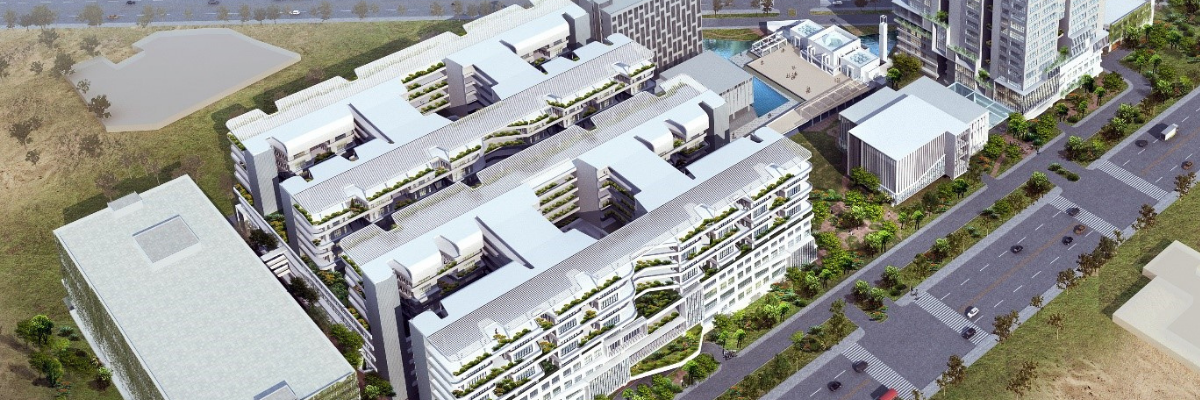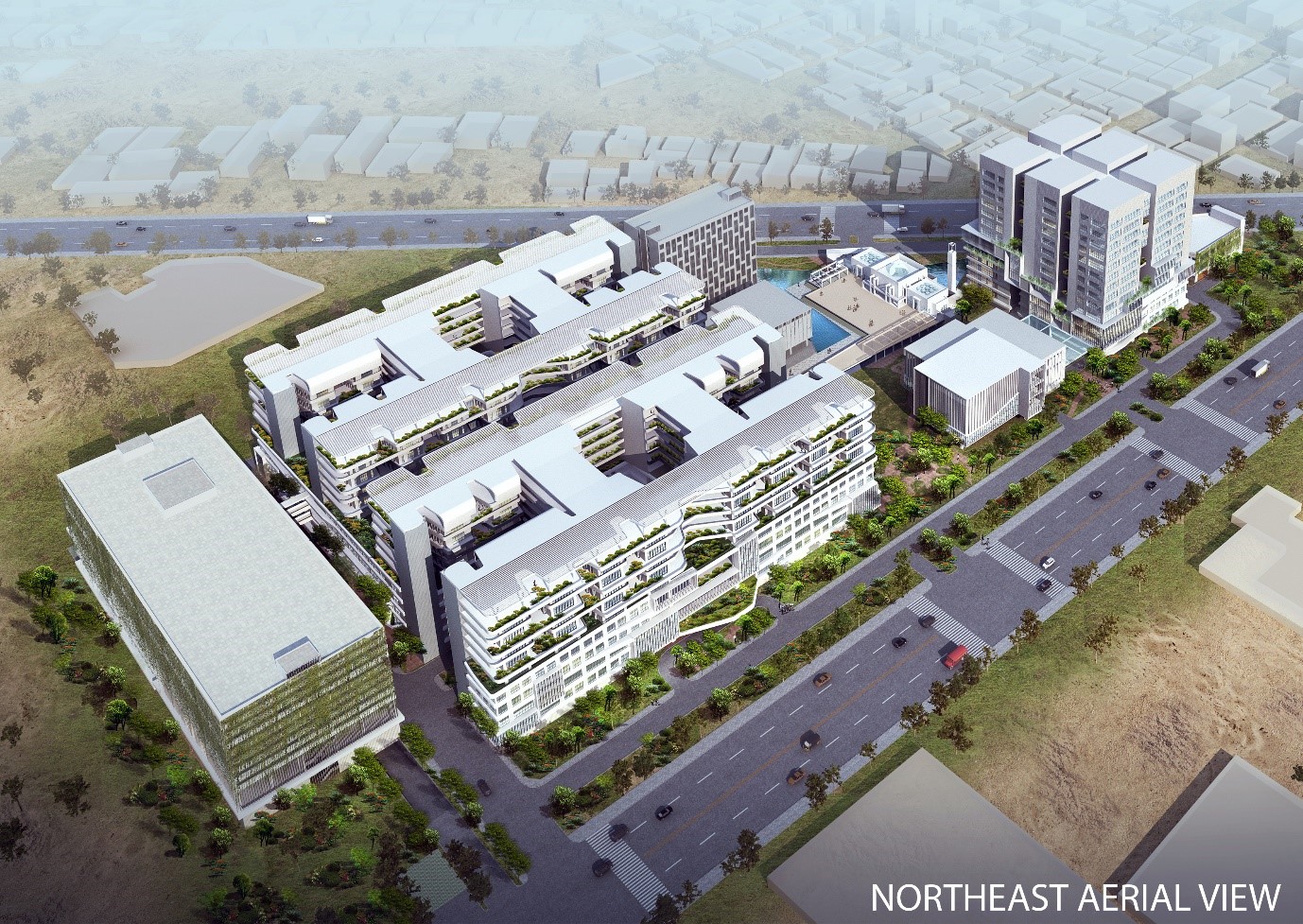
Conversation With… is a series of articles featuring personalities within CPG Corporation and its diverse partners who inspire.
In a world of burgeoning healthcare costs, how can healthcare providers collaborate with architects and engineers to broaden access to necessary healthcare?
Dr. Abdul Bari Khan is the Chief Executive Officer of Pakistan’s Indus Health Network, which provides indiscriminate, free-of-cost, high quality healthcare to all who steps through their door.
Started in 2007 by a team of committed healthcare professionals, entrepreneurs, and philanthropists, who sought to address the unmet healthcare needs of local communities and change Pakistan’s healthcare system dynamics, the Indus Hospital has not only become Pakistan’s first completely paperless hospital, it has also evolved into the Indus Health Network with hospitals across the country.
Dr. Abdul Bari Khan was one of the guest speakers at the Shape the World Summit 2019. Focused on the topic of inclusive healthcare, Dr. Bari Khan shared the Indus Health Network’s operational model and how the Network is doing its part in addressing healthcare inequalities.

Dr. Abdul Bari Khan (seated 2nd from left) and Ar. Lim Lip Chuan (standing and holding the microphone) at the Shape the World Summit 2019
We sat down with Dr. Bari Khan and CPG Consultants Senior Vice President, Ar. Lim Lip Chuan to hear more about the Indus Health Network and their partnership with CPG Consultants in the broadening of inclusive healthcare efforts in Pakistan.
Editorial: Hello Dr. Bari Khan and Ar. Lip Chuan! It’s great to speak with both of you. We last saw you at the recent Shape the World Summit 2019, where Dr. Bari Khan spoke about inclusive healthcare and the Indus Health Network’s model. For readers who didn’t attend the event, would you like to share how the Indus Hospital provides inclusive healthcare?
Dr. Bari Khan: We believe that everyone has the same right to health; all people should have equal access to quality healthcare in their own communities. We started off as a tertiary healthcare facility but over the years, we realised that it’s creating a huge burden on the national healthcare system in Pakistan so it became imperative to establish primary care services in the communities such that people with minor and easily treatable illnesses don’t have to go to secondary and tertiary care hospitals. Indus Health Network is currently operating in 41 districts of Pakistan through primary care clinics, mobile, container and boat clinics. Our system is doing its part in reducing the burden on Pakistan’s healthcare system.
Editorial: Why does the Indus Hospital believe in free healthcare for all?
Dr. Bari Khan: Access to quality healthcare is one of the most fundamental human rights. However, most developing states fail to provide it. Pakistan is the fifth-most populous country, with a population exceeding 212,742,631 people. According to an estimate, Pakistan spends only 0.5 to 0.8 per cent of its GDP on healthcare. The remaining unmet need for quality healthcare is being met by public and private; profit and non-profit service providers. The gap between healthcare needs and supply leads to a vacuum, which is alarming and has devastating consequences for the majority of Pakistan’s population.
Looking at the existing economic situation of the majority population, we have been trying to help the downtrodden with medical aid. In 2005, a few colleagues and supporters decided to do it in an organised manner, via a state-of-the-art healthcare facility, without hurting the dignity of patients. This resulted in the emergence of the Indus Hospital.
We believe that every person should be offered the best healthcare, irrespective of their religious, sectarian, or financial background, and nobody should be deprived of healthcare assistance even if they don’t have the means to attain it.
Our prototype has been so successful that we have eventually multiplied it on a national level.
Editorial: Any downsides to providing such universal free healthcare? How does the Indus Hospital keep operational cost manageable?
Dr. Bari Khan: Yes, providing such universal free healthcare has many aspects to it. Even a basic fever treatment requires money, so running a country-wide network of hospitals, physical rehabilitation centre, blood centres, primary care units, container and boat clinics equipped with the most modern equipment, healthcare and allied health professionals, need a great amount of money continuously . Indus Health Network is an indigenous network that solely relies on individual and corporate donations and government grants. However, the ever-growing patient needs require us to look for even more resources.
Editorial: Understand that CPG Consultants is helping the Indus Hospital expand into a new academic medical campus. Ar. Lip Chuan, could we know more details about that?
Ar. Lip Chuan: In 2012, Indus Hospital was searching for a competent hospital design consultant to plan their hospital expansion. Some members of the Indus Hospital’s senior management visited Singapore and CPG Consultants. We hosted them with a visit to Khoo Teck Puat Hospital, where they were impressed with our hospital design and our team’s capabilities. We were very humbled by Indus Hospital’s vision for an inclusive healthcare model that is free of cost, and we later visited the Indus Hospital in Pakistan.
At Karachi, we witnessed the community self-help spirit of Pakistan. The public hospitals were inadequately resourced to cater to the needs of Pakistan’s population, hence the community responded with donations and sponsorships to provide healthcare for the underprivileged. Affluent business communities, individuals and successful healthcare professionals all contributed through the Zakat principle.
CPG’s role was to plan and create a roadmap to transform the existing Indus Hospital into a comprehensive academic medical campus, where healthcare, education and research are integrated, in line with its vision and mission through a sustainable and scalable development according to their needs.

An aerial Southwest perspective of the Indus Academic Medical Campus
Editorial: With the global emphasis being increasingly on the environment and sustainability, how is the new Indus Academic Medical Campus designed for greater environmental sustainability?
Ar. Lip Chuan: CPG master planned the Indus Hospital campus with the following sustainability strategies:
- Passive Design
To keep energy cost low, CPG recommended the use of natural ventilation for the corridors and wards. Passive architectural design principles were adopted by aligning the building orientation to the prevailing wind direction, retaining spacing between buildings, having ventilated fenestration design, and creating every bed with a window (for ventilation, daylight and view), such that a comfortable environment with individual patient control is created. - Active Design
For air-conditioned areas, CPG recommended the use of energy conservation measures, such as high efficiency air-conditioning systems and energy recovery strategies. - Water Supply
Understanding the water scarcity challenge in Karachi, CPG recommended a Net Zero Water strategy using recycled water and ground water.
- Passive Design
Editorial: In terms of being culturally sensitive, how does the new Indus Academic Medical Campus fit into its surrounding landscape, and are there any community elements to it?
Ar. Lip Chuan: As the new Indus Academic Medical Campus is an Islamic institution, CPG was very sensitive to the need for spiritual health in the campus master plan, with the provision of a mosque for the community, suraus and respite spaces in the wards, and gender separation for wards and student hostels. As strong believers in biophilic design, we also introduced greenery into the campus both on the grounds and at the ward balconies and roof terraces. A landscaped pond, serving as a reservoir, was also proposed in the mosque courtyard for the surrounding community to enjoy.
Dr. Bari Khan: Yes, that was a challenge. I would also like to comment that space constraints were a very real limitation, and we tried our best to address this to the maximum possible extent.
Ar. Lip Chuan: Indeed, with the new campus having a high development density, we had to creatively maximise the presence of greenery beyond the limited grounds. This is done through active incorporation of landscaped balconies and roof terraces.
Editorial: So why did the Indus Hospital choose to work with CPG Consultants for this expansion?
Dr. Bari Khan: When we started thinking about expansion in 2012, just five years down the road since our inception, we found that resources for designing and developing mega healthcare facilities were pretty limited in Pakistan. So we explored the South-East Asian region, and visited around eight hospitals in Malaysia and Singapore. Thereafter, we decided to embark on this journey with CPG, which had previously done large healthcare projects in South-East Asia and India.
Ar. Lip Chuan: We are glad that CPG’s experience in health-oriented developments in Singapore and Asia captured the attention of Indus Hospital. Dr. Bari Khan and his team have an admirable vision, which we are able to help achieve with our team’s strong value propositions and commitment.
Editorial: Ar. Lip Chuan, does CPG Consultants have other similar healthcare projects? What is the unique design philosophy that underpins these projects?
Ar. Lip Chuan: CPG has previously master planned similar academic medical campuses in various countries across Asia. In Singapore, we had carried out the Outram Medical Campus (45 Ha) and National University Hospital Masterplan (16 Ha). In China, we did the Linyi University Hospital Campus (37 Ha) and Dali Prefecture Hospital Academic Medical Campus (7.8 Ha). In Brunei, we completed the RIPAS Hospital Campus (10 Ha). In all these medical campuses, CPG’s unique medical planning principles focus on being sustainable and people-centric (for patients, visitors and staff). Planning for sustainability includes operational efficiency, advancing healthcare through education and research, and creating green and healthy environments.
Editorial: Any thoughts on the future of healthcare architecture/ design? How would you envision the design of future hospitals/medical centres in addressing the need for and catering of inclusive healthcare?
Ar. Lip Chuan: Understanding that constructing healthcare infrastructures takes a longer time than medical technology advancement, CPG future-proofs its design by enabling flexibility, modular construction, and scalable expansion. The use of Information Technology and the advent of Artificial Intelligence in healthcare will redefine the concept of a hospital. With the exception of inpatient and acute care, most day care consultations, diagnostics and treatment can be delivered remotely from the hospital. The future hospital will be the knowledge hub serving a network of community care centres, making healthcare more accessible and affordable.
Dr. Bari Khan: Healthcare industry is one of the most dynamic industries worldwide, where new interventions and technologies arise every year. The design of a healthcare facility must be envisioned in a way to accommodate these modalities. This especially holds true for a tertiary care hospital. The interesting and most challenging aspect is that one may not actually have much information during the design phase regarding these future interventions in years to come. There is always a necessary niche of out-of-the box thinking in such cases.
Editorial: To end off, could both Dr. Bari Khan and Ar. Lip Chuan share with us what you both learnt during the overall planning process of the Indus Academic Medical Campus?
Dr. Bari Khan: I think the liaison among architect, medical planner and end-users, i.e. doctors, while designing the Indus Academic Medical Campus, was key. In fact, the medical planner played the role of a bridge between the other two, as he understood the wavelength of both architect and end-user, and placed right questions, especially to doctors. In summary, the stronger the coordination among all, the finer will be the resultant design.
Ar. Lip Chuan: We learnt that a free healthcare model can be delivered professionally, sustainably and grown through good governance and management. It is a privilege to collaborate with Indus Health Network, and we look forward to more successes in delivering the humanitarian mission of the Indus Health Network.


